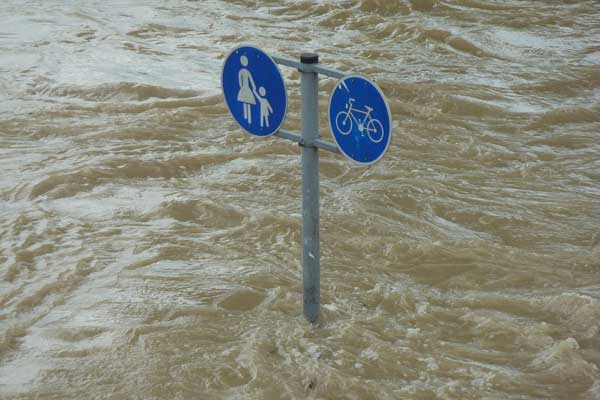Toronto’s severe flooding serves as a stark reminder of increasing global flood disasters

[Flood with sign. Credit to Pixabay]
On July 17, 2024, Toronto experienced severe flooding, which resulted in numerous buildings and roads being flooded with water.
The deluge caused widespread chaos, severely disrupting transportation and daily activities.
In addition to extensive structural damage, the flooding led to significant power outages across the cities, leaving many residents and businesses without electricity.
One of such critical events was just a few weeks ago when nearly 170,000 residents were left without power, as reported by The New York Times (NYT).
The Toronto Fire Service, in an interview with the NYT, reported, “It rescued more than 20 people from cars and buildings, received nearly 1,700 calls for help, and attended to more than 500 incidents between 6am and 3pm on Tuesday.”
This phenomenon is not unique to Toronto alone, as cities worldwide have faced similar challenges due to increasingly unpredictable weather patterns.
On July 18, 2024, South Korea experienced severe flooding and landslides due to heavy rainfall.
According to Crisis 24, a news agency specializing in security risks, numerous residents were forced to evacuate by the authorities in places such as Eungye-dong, Osan Five Color Market, Cheonghak-dong, Gwol-dong, and Sinpyeong.
Electricity and telecommunications systems were disrupted, and overland travel was hindered.
Tragically, four lives were lost in this incident according to the Al Jazeera news network.
An unnamed weather agency had told South Korea’s Yonhap news agency that the severity of these events is typically only seen once every 200 years.
The situation worsened on July 20, 2024, when flash flooding in China claimed the lives of at least 12 people, with dozens more reported missing.
The disaster occurred when a highway bridge collapsed during heavy rainfall.
The New York Times reporter Keith Bradsher, based in Beijing, reported that 12 bodies and seven vehicles had been recovered, with only one person rescued.
The search continues for 18 vehicles and 31 missing individuals.
These recent floods and natural disasters hint at the worsening impact of climate change.
Toronto Mayor Olivia Chow emphasized the urgency of addressing climate change, stating, “We really seriously have to deal with climate change because these kinds of days are going to be more frequent.”
Mayor Chow’s concerns are echoed by experts.
According to the United States Environmental Protection Agency (EPA), rising temperatures lead to increased water evaporation, altering both the size and frequency of precipitation events, which in turn raises the likelihood of flooding.
As a matter of fact, climate change has increased the severity of all natural disasters over the past few decades.
Our World in Data, a source that accumulates data from multiple countries over multiple years, reveals that the world has gone from almost 0 floods in 1900 to 166 floods in 2023.
The numbers for all natural disaster events as a whole are much higher, going from 6 per year to 410 in 123 years.
Despite remarkable technological advancements, from the advent of colored television to the early foundations of artificial intelligence, the world remains responsible for the environment and the consequences of its actions.
It is important to be aware of these issues and to actively take part in resolving them, whether by staying informed or taking action.

- Chaewon Lee / Grade 9
- Seoul Foreign School

![THE HERALD STUDENT REPORTERS [US]](/assets/images/logo_student_us.png)
![THE HERALD STUDENT REPORTERS [Canada]](/assets/images/logo_student_ca.png)
